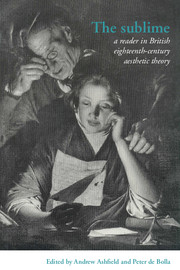Book contents
- Frontmatter
- Contents
- List of Abbreviations
- Introduction
- Part I The Longinian tradition
- Part II Rhapsody to rhetoric
- 11 The spectator, (1712-1714)
- 12 A discourse on ancient and modern learning (1734)
- 13 Characteristicks (1714)
- 14 The works (1724)
- 15 To David Fordyce, 18th June 1742
- 16 The pleasures of imagination (1744)
- 17 An essay on the sublime (1747)
- 18 Observations on man (1749)
- 19 Lectures on the sacred poetry of the Hebrews (1753/1787)
- 20 A dictionary of the English language (1755)
- 21 Conjectures on original composition (1759)
- 22 The art of speaking (1761)
- 23 A course of lectures on oratory and criticism (1777)
- 24 An enquiry concerning the principles of taste (1785)
- Part III Irish Perspectives
- Part IV The Aberdonian Enlightenment
- Part V Edinburgh and Glasgow
- Part VI From the Picturesque to the Political
- Sources and further reading
16 - The pleasures of imagination (1744)
Published online by Cambridge University Press: 05 June 2012
- Frontmatter
- Contents
- List of Abbreviations
- Introduction
- Part I The Longinian tradition
- Part II Rhapsody to rhetoric
- 11 The spectator, (1712-1714)
- 12 A discourse on ancient and modern learning (1734)
- 13 Characteristicks (1714)
- 14 The works (1724)
- 15 To David Fordyce, 18th June 1742
- 16 The pleasures of imagination (1744)
- 17 An essay on the sublime (1747)
- 18 Observations on man (1749)
- 19 Lectures on the sacred poetry of the Hebrews (1753/1787)
- 20 A dictionary of the English language (1755)
- 21 Conjectures on original composition (1759)
- 22 The art of speaking (1761)
- 23 A course of lectures on oratory and criticism (1777)
- 24 An enquiry concerning the principles of taste (1785)
- Part III Irish Perspectives
- Part IV The Aberdonian Enlightenment
- Part V Edinburgh and Glasgow
- Part VI From the Picturesque to the Political
- Sources and further reading
Summary
[Note]
The influence of the imagination on the conduct of life, is one of the most important points in moral philosophy. It were easy by an induction of facts to prove that the imagination directs almost all the passions, and mixes with almost every circumstance of action or pleasure. Let any man, even of the coldest head and soberest industry, analyse the idea of what he calls his interest; he will find that it consists chiefly of certain images of decency, beauty and order, variously combined into one system, the idol which he seeks to enjoy by labour, hazard, and self-denial. It is on this account of the last consequence to regulate these images by the standard of nature and the general good; otherwise the imagination, by heightening some objects beyond their real excellence and beauty, or by representing others in a more odious or terrible shape than they deserve, may of course engage us in pursuits utterly inconsistent with the laws of the moral order.
If it be objected, that this account of things supposes the passions to be merely accidental, whereas there appears in some a natural and hereditary disposition to certain passions prior to all circumstances of education or fortune; it may be answered that although no man is born ambitious or a miser, yet he may inherit from his parents a peculiar temper or complexion of mind, which shall render his imagination more liable to be struck with some particular objects, consequently dispose him to form opinions of good and ill, and entertain passions of a particular turn.
- Type
- Chapter
- Information
- The SublimeA Reader in British Eighteenth-Century Aesthetic Theory, pp. 86Publisher: Cambridge University PressPrint publication year: 1996

